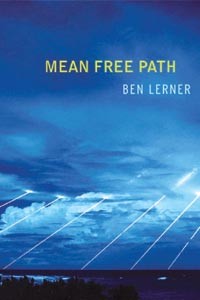In Ben Lerner's new collection, Mean Free Path, poems don't always begin at the beginning, and they seldom continue in the middle, let alone end at some end. Still, look at how Lerner opens the book.
Mean Free Path begins with a narrator finishing a public reading (of his poems, presumably), looking up, and feeling both "changed in the familiar ways" and ready to seek "a quiet place to begin the forgetting."
The 10-line stanza is about the last in the book that's linear -- each line literally depending on the last. The rest -- dozens of stanzas through four sections -- are continuously discontinuous, a series of thoughts interrupted by other thoughts. One stanza goes:
A flowering no one attends
The enterprise known
variously as waking, April, or
Bats are disappearing like
color into function. I wanted to open
In a new window
the eyes of a friend
by force is necessary. Amber light
Is a useless phrase
In Mean Free Path, Lerner, a nationally regarded poet who teaches at the University of Pittsburgh, touches on subjects from love and war to impending environmental catastrophe. But the book is most fundamentally about communication. Mean Free Path sadly and beautifully reflects a fractured, soundbitten world where channel-surfing is the only permissible mode of transportation -- a world in which no one, no matter how thoughtful, is permitted to finish his sentences, or is perhaps even able to.
The book's title is the physics term designating the average distance a particle travels before colliding with another particle. Two sections are also titled "Mean Free Path." The other two are called "Doppler Elegies," referring to the apparent warping of sound or light waves when their source and their observer are in motion relative to one another.
Indeed, the poem's narrator always seems to be both describing and addressing moving targets. Some of his auditors are also attempting to communicate, but their voices are often self-negating: "You're not listening. I'm sorry. I was thinking / How the beauty of your singing reinscribes / The hope whose death it announces."
A key subject is war, specifically the endless conflicts of American empire in the age of remote-control weaponry. The collection's most oft-cited color is "night-vision green"; meanwhile, death is doled out with a couch potato's nonchalance. "Sophisticated weaponry marries the traditional / Pleasures of perspective to the new materiality / Of point-and-click," writes Lerner. "I'm writing this one / As a woman comfortable with leading / A prisoner on a leash."
As with his fellow Pitt faculty member Lyn Emanuel's bracing new collection, Noose and Hook, however, Lerner is less concerned with war itself than with our reaction to it -- feeble, forgetful, dismissive. "For the mode of address / equal to the war / was silence, but we went on / celebrating doubleness," he writes in the book's dedication.
Lerner incorporates some self-conscious references to his own experimental approach ("Look for me / At genre's edge. I'm going there on foot"). But for all its fragmentation, this book is endlessly quotable, gems emerging from seeming confusion: "It isn't a culture of fear. / When a people / Pats itself on the back with a numb hand / It isn't a culture at all."
The forms Lerner employs are, of course, part of his meaning: "I'm not above being understood, provided / The periodic motion takes the form of / Work is done on the surface to disturb / Traveling waves."
That meaning, he adds, is one only poetry can provide:
I did not walk here all the way from prose
To make corrections in red pencil
I came here tonight to open you up
To interference heard as music















